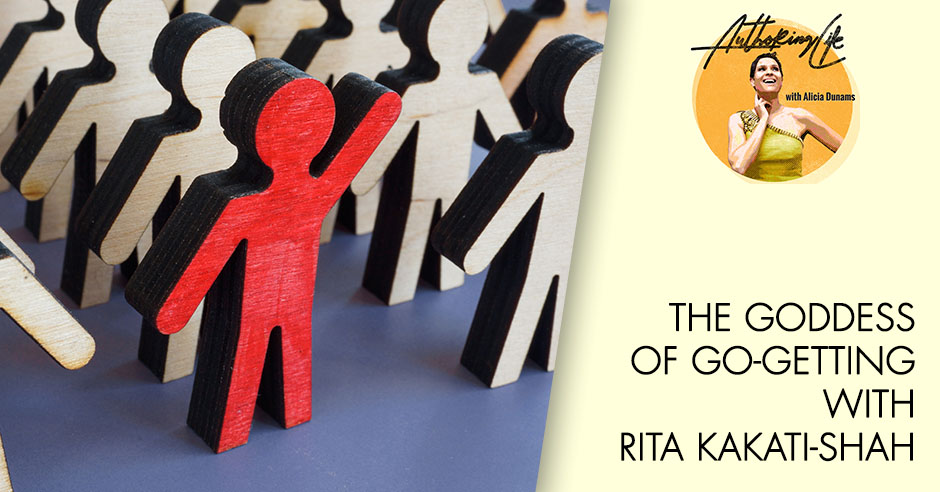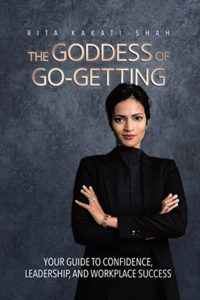
The Goddess of Go-Getting is the new book of Rita Kakati-Shah. It talks about looking at the world through a different lens and how you bring your unique self out. So many people just view it through one lens, which leads to so many problems when it comes to inclusion. Join Alicia Dunams as she explores the book deeper with Rita, tapping into a range of topics from empowerment over entitlement to diversity. Aside from being an author and a strategist advisor, Rita is the founder of Uma, a diversity and inclusion training program. So stop trapping yourself into one view and open your mind. Learn more about her book and her program today!
—
Listen to the podcast here
The Goddess Of Go-Getting With Rita Kakati-Shah
I’m very excited to welcome Rita Kakati-Shah.
I’m glad to be here, Alicia.
I’m glad to have you here. Let’s tell a little bit about Rita. She is a multi-award-winning Gender Diversity and Inclusion Career Strategist and Advisor for Forbes and Fortune 500 companies. She’s also an author and a TV show host. Specifically, we are going to be talking about Rita’s new book, The Goddess of Go-Getting. A little bit more about Rita. She founded Uma, which is an international diversity and inclusion, coaching consulting, and corporate training platform. I’m looking to learn more about that during our interview. Rita, it’s great to have you.
Thanks for having me, Alicia. It’s such a pleasure being here.
I always like to get started asking you this question. Why did you write a book?
I started this in 2020, at least at the start of the pandemic. I have been in the DEI space myself for many years now, before it was even a thing. I came through investment banking. I transitioned into the pharmaceutical industry. I then transitioned into my most tough career pursuit of all time. That was being a mother. I remember that. I saw many things happen and so much narrative on gender equality in the DEI space. I thought, “There’s a big disconnect with the reality in what I was experiencing and seeing.” I have a global audience. I love traveling myself. I’m everywhere, so I needed to get my views down on paper.
When I started to write the book, I couldn’t go into my personal journey. Initially, I thought, “This is going to be a business book. I’m going to write a business book.” As I started to write, it became more of my personal story. When I started to write, I thought I couldn’t write this book without delving into my personal story because that is exactly what shaped my professional story. It’s a book that tells all. It’s about my professional journey. It’s a book for everybody. You don’t have to be a woman. You don’t have to be somebody from an ethnic minority. It’s something that touches everybody in society.
This is such an important time to be talking about diversity equity inclusion. It’s never not a good time to talk about that work. Specifically, it’s something that has been more mainstream in the last couple of years. I love that this book addresses things and is your own personal story as well. Tell me some of the things that readers will learn by reading your book.
There are several chapters on different aspects of diversity inclusion. When you first tackle the topic, quite often, you think it is just basics about if you are a woman or you come from an ethnic minority. It’s not. I start by talking about the many shades of diversity. That’s at the very start of the book. I give examples of what it actually means to be a minority.
When you are a minority, you could be in any situation in life where you were the lesser of that situation. You could be a vegetarian at a barbecue. You could be the one person that practiced a different religion, and you are in another festival of some sort. At that moment, you are a minority. Everybody, at some point in their lives, has felt that whatever country, religion, language you speak or background is.
If you don’t feel valued for who you are, you’re going to switch off.
It does touch upon that feeling that everybody at some point understands. We talk about the many shades of diversity there. We also talk about not stereotyping and pigeonholing people because of the background they are from. I give personal anecdotes of my own personal story, where during the week, Monday to Friday, I was the only Brown girl in my very White school when I was young.
At weekends, I was signed up for classical Indian dancing. It was a South Indian dance form. I loved it. I signed up because my mom made me, that’s number one but I fell in love with the costume and the color of everything being shared. All of a sudden, I was the fairest in the room because everyone that practices a South Indian dance in Dravidian nations is much darker than me. They wouldn’t talk to me either.
I was left in a situation where here’s me, a 6 or 7-year-old girl, formative years, figuring out, “Who am I? Who was I? Where did I fit in?” These are things that you don’t always realize, and then you think, “That person looks like they are from the Indian-some continent. We are going to stick them in that category.” It’s very different, the culture, food, language, practice, dance forms, and music. Everything is so different. I talk about many facets like that. I talk about cultural nuances and the difference between empowerment and entitlement.
I do a lot of work with universities, children, and the workforce. That’s a question I get a lot, “We are hiring these people in the university.” They are so entitled. How do you make them empowered? That’s one thing I talk about. The difference between listening and empathy, above all, is how you start that journey of being empowered over giving your voice out there, which is entitlement. It’s so many different trinkets of wisdom I love to share in the book.
That’s powerful, especially how more and more gender, identity, race are evolving and transmuting. People see themselves as lots of different things. You were able to come from that place in your book and talk about the unseen and seen elements of diversity because there are the diversity things that you might be able to see with your eyes and things that you cannot see.
For example, somebody’s religious background where you might not necessarily see that, their education, or if they are a veteran or not, and the things that you might be able to see like skin color and gender, which is not something you can necessarily see. As these evolve, it becomes even more complicated to navigate that.
I love what you share in your book in terms of entitlement versus empowerment because there’s a halo effect bias in which if someone went to Harvard University, they somehow have more of a halo around their head versus someone who went to a different type of university. We get to notice the bias and those things. Please share some more that people can learn from your book.
Thanks for pointing those things out. When you talk about the bias that is out there, that is a big proponent of this and our perception of things. I will talk about an example of when I was very young. At five years old, I was on the playground. This was during the Monday to Friday school days. At the time, my best friend came to school one day and said, “My parents said you couldn’t come and eat with us. You have to eat that. Gross. That’s what you and your people eat.” That was my first exposure to anything that we call racism these days.
My friend wasn’t racist. They didn’t even know what they were saying. A week after, we were playing again. They just repeated something they heard at home. There’s a bias. There is something that they heard at home and transferred onto me. I had my lip on myself at the time. Here’s one thing. At the start of my book, I talked about that example. Everyone was like, “Racism.” Later in the book, I talked about perception and where that’s coming across.
As you explore and go into it, you think, “Where is this coming from? Is it that child? Is it something that’s influencing the child from outside?” What happened was I’ve got a bit of a lip on me. I asked that child. I said, “I don’t know how to do that. If you show me that, maybe I can copy it.” That led to a bit of laughter all around the room, and that child never did it again.

Things like that. It’s almost like it’s your perception. The first perception is, “Racist child out there on the playground, five years old. How could they?” When you look at it differently, you think of a clueless child about who’s influencing and saying this. That’s the thing. You are polishing your children at this age. You are picking up things that are around you and your surroundings.
If you watch something on TV, if you hear your parent, your first role model in your life, directly or indirectly, you will repeat it. It’s things like that. The week after, we were best friends again. We spoke about what we spoke about, rough and tumbling, and playing in the playground, whatever it was. These are part of the things I talk about, perception and bias.
If you look at one lens, you see one thing. Open your mind, take the time to question, listen, and read the room. You are going to find out, “It’s not what I thought it was. If I take the time to listen, observe, and watch, I can turn this entire situation around.” There’s a big part of the book that talks about perception. That’s where I talk about entitlement and empowerment.
The journey starts when you listen, observe, and have empathy. You take the time to understand someone else’s viewpoint. You don’t have to agree with it. Nobody says that but understands where they are coming from. Where does that influence come from to understand where and why they are saying what they are saying? That would make you understand things through a different lens. When you then respond to it, you respond in a different light. It’s more of understanding light.
If people did that more in the world, we would have far less controversy and arguments. People would understand each other more. At the end of the day, we are creatures of habit. We resonate with what’s around us. We are humans. We love being social. We love the community. We all want to feel that sense of belonging. I talk about belonging and value in the number one system.
Seventy-nine percent of people leave the workforce if they don’t feel that sense of belonging. It can be the corporate world, academia or school setting. If you don’t feel valued for who you are, you are going to switch off. At that point, if someone dangles a golden carrot and offers you a bonus, a pay rise or title, even if it were switched off, the damage is done. My point being is to get to understand where it’s coming from. Create that sense of belonging. That’s what it’s all about. It’s DEI. Everything else around it is fluff.
It’s something that is so important when you talk about observation. I call it #JustNotice. Just notice when people say something. It requires us to be witnessing energy, witnessing what’s happening versus reacting to something. It’s using a different part of your brain, “I’m curious why they said that. I’m curious where they learn that from.” As you mentioned, we all have a different lens through which we view life.
There are 8 billion people in the world and 8 billion lenses through which people view life. That is something important to understand. If you notice and take a beat and a breath, that will give you an opportunity to build your empathy and be able to get to, “What are they saying? How can I understand? How can I be of support?” That requires a different level of you, not reactionary Alicia but a responsive Alicia. That’s what I love that you bring this to the table in your book.
Thanks for mentioning that because that’s something we all go through. I don’t think there’s anyone out there who’s perfect. We all take a step back, “Did I just do that?” It’s the same with cultural biases. I was born and brought up in the UK. I now live in New York City. My family comes from Assam, in Northeast India.
When I first moved to the US, I was at a networking event. People have a normal skin tone. They stuck me in the area with other Indians that come from India. I can chat with anyone. I have traveled here and everywhere but I had far less in common with those folks. Suddenly, when I heard a British accent in the background, I would resonate on a boom, “Who’s out there? What do they disclose in this? What’s going on?” That was because that was the environment that I grew up in. People pass too much judgment on the way you look and sound, where they think you are going to be.
The decency quotient combines your IQ with your EQ. It’s the genuine desire to do right by others.
They are trying to help but by doing that, they are actually segregating us. I had far less in common. I could chat with them. I was homesick when I moved to the US. I was craving anything. I became overly patriotic. It was all Queen and Country for me when I first moved. It was very much a system of understanding where people are coming from, knowing that there’s a different lens. There’s a different way of things. Don’t just assume. We spend too much time assuming things. Part of that is our intelligence, as we like to call it.
I dedicate an entire chapter in the book to the decency question about not making assumptions. We were judged back in the day upon our IQ, whether a schoolchild or later in life, on how intelligent we were, how we were, and how we were going to perform at a job. That soon moved on to the EQ, Emotional Quotient, on how much you can understand, so it’s better. You understanding better doesn’t mean you are going to get to be a good boss or going to be a good employee later on, not necessarily.
What we did was talk about the decency question. This is a phrase I have heard before myself. There’s a professor that wrote and spoke about it. I love this concept of the decency question because it combines your IQ with the EQ. It’s the genuine desire to do right by others. That’s the difference. You can inadvertently segregate your team as a manager.
If you only try to help the mum who’s returned to work, and you are forgetting about the needs of the other employees who might have their own hobbies, who are there day in and day out, you build resentment. Being a decent manager means looking at everybody, understanding needs, and trying to help everyone equally in the best way possible.
That’s a powerful way. It’s, “How can I help others? How can I focus on others?” How do you suggest people do this in your book?
One of the things I do in the book is talking about when you want to help others, how can you spread it out? I give an example of one of my clients who managed a mother. She was coming back to the workforce and was being overly compensated. She just came back. I have kids on my own. I get it. If you want to leave early on a Friday or whatever, you do that. What they did were two things. It made that mother feel out of place. She was like, “I don’t want to be called out. I want to have a private agreement. I can do that but I don’t want to be called out for it.”
Number two, it was building resentment in the team. Everybody else is like, “I have been here day in, day out. I’m working my socks off. Why is that person getting favorite treatment?” I spoke to the manager and said, “If you want to be a fully decent manager, you don’t want to be cutting up the rest of your team. What you can do is you are promoting work-life balance. Find out what people’s hobbies are and what people are doing.”
You can let that one person go home at 4:00 PM on a Friday. Speak to someone else who has a hobby of playing tennis, and they never get time to do it. You leave on a Monday or on a Friday at another time at 3:34 PM. You alternate like that. You are showing that you are prioritizing everybody else’s needs based on what they need. There are many examples like that but that was just one example of how you can genuinely understand other people. You are not shortchanging or calling people out. You are helping others on the team as well.
That’s an important distinction. Are you finding that with the popularity and how more and more DEI work is happening in corporations? Do you find that people are resentful that this conversation is happening? From my experience, I know I have. I have had some interesting facilitation and workshops where people are full-body closed off, arms crossed. I’m curious what your solution is to that, “We have a DEI workshop,” or people don’t want to talk about it. People want to touch it with a 10-foot pole. What is your solution to that?
One of the things I get called in to do is fix. Fix situations where it’s even more divided. I’m going to give you an exaggerated example to hone in on the point. There could be somebody coming in who’s already done a DEI talk and spoken about an issue. I will give two examples. When the US elections happened a few years ago, when the George Floyd incident happened straight after that, it opened up a funnel of lots of DEI talks. Conversations happen in the workplace. I then went and got called in a couple of months later. They said, “You’ve got to fix what’s happened now. Nobody is talking to each other. People have segregated now. We need help. People are leaving, and this is not where we want to be.”

My first thing is like, “Give me a bit of the Law of the Land of what’s happening.” To your point, people are switched off by this. An exaggerated example would be that colleague of mine in the workspace would come in, and he or she would basically say that, “You are White, you are bad. You are Black, you are good.” You were suddenly being raised into it rather than we are creating a sense of community.
How do people feel that sense of belonging? What can we do to support different viewpoints? What has been going out in the news media nowadays? It’s the same with the elections, different viewpoints, and war scenarios going on in the world nowadays. Anytime there’s a different viewpoint, there’s a different way of addressing it.
That’s where entitlement versus empowerment comes up, by understanding others. You don’t have to agree with it but you have to take the time to understand, read the room, and listen. That makes you a good colleague, leader, and management as well. It’s teaching people the skills and taking a step back. Do not judge straight away. You might have your own viewpoints but take the time to understand others’ viewpoints first. You don’t have to agree but understand it first. That is the first journey to empowerment.
If you cannot be empowered, you cannot even be in touch with this DEI space with the barge pole. That’s the first thing. I start by addressing those commonalities first. It’s quite an easy thing. We humans like to converse. We like to listen if you give everyone the space but there’s so much anger built up. There are so much things going on.
I will give you another example. One of the things I teach is communication and negotiation. If I wanted to get my kids to clean up their room, there are two ways I can do that. I can shout at them and say, “That’s such a mess. Clean it up now.” They sometimes do it. They will probably do it but will they respect me? They will be scared of me. The other ways I can say, “That’s nice. What have you guys have built? I can understand that structure is a little bit messy over there. Wonderful. Now let’s clean it up. Let’s clear some more space, and we will come back to it again tomorrow.”
There’s a different way of engaging with it. If you want somebody to change their viewpoint and think of something different, and you go out there by saying they are wrong and shouting at them when they are already angry, what’s that going to establish? Even if they were on the cusp, you have now pushed them into the other way completely.
Instead, if you look with a perspective of understanding, “I understand where you are coming from. It must be hard for you, going through all of what you are doing.” If you start with that sense of empathy, you can turn that conversation into something very different. People don’t do that enough. If they were to, this could be a very different conversation. Using these common skills of negotiation of communicating better can be at the cusp of helping form unity, which is what DEI is supposed to be about, not segregation.
Those are all important points you have made. It all comes down to communication and having the emotional intelligence skills to be able to communicate, have empathy, and slow down. Everything you are sharing with us is so important. When we are able to be neutral, even though we might feel that we have been offended and hurtful, and that example you shared where you come in like the fixer with your organization of all this kind of segregation and conflict that happened out. Some of this DEI work that was supposed to create unity is about slowing down and communication.
It’s about having an EQ be able to notice and observe. Observation is so important. You can find The Goddess of Go-Getting on Amazon.com. You want to support Rita by purchasing your book on Amazon or your local bookstore. Rita, I want to jump into our speed round, where I’m going to ask you some questions, and you will share the first thing that comes to mind.
Sounds good.
The differences between listening and empathy are how you start your journey of empowerment over entitlement.
Rita, what is going to be your legacy?
My kids, and what they do in the future.
Favorite book?
The Goddess of Go-Getting. There could be no other.
Favorite author?
I have a few but I’m going to say Indra Nooyi at the moment because she was one person I modeled who I wrote my book after in a way because she has a business background as well and has fought a lot especially in India and US jointly.
What’s the name of her book?
What are you going to read next? What’s on your bookshelf?
I have a few different books on my bookshelves. My next book, because I’m talking about the DEI space, has very much to do with culture and bringing people together. I’m in the process of doing a lot of work on the children’s side because that’s where the next education comes from, reading what’s next in line. Watch this space because I’ve got another cultural nuance coming up for everyone to read. Take a look out.

That’s great because at least our next question is about what you are writing at.
It is a book about time-traveling as it happens. It’s about bringing generations together because there was a divide between generations, cultures, kids not getting the future, and the adults not getting what kids are all about. It’s about time traveling and bringing up different cultures that I grew up with. That’s what is coming out next. We are still thinking of the name. It’s going to be a fiction book.
Thank you for the speed round. Let’s go back. I want you to share one thing that you want to leave our audience with when it comes to your book The Goddess of Go-Getting and your expertise in the DEI field.
One thing I want to leave behind is don’t forget everybody is unique. We spent so much time trying to be like others. I mentor for a living. I do that. I look at and see other role models as well. When we look at other role models, it’s great. It’s that phrase, “If you can’t see it, you can’t be it.” That’s great to have these role models but don’t try to just be that role model.
Remember, every single person out there who influences and empowers you is unique. There is nothing even common about them if you look into it. You have something unique inside already. The Goddess of Go-Getting talks about how you bring that unique self out. How do you get that inner goddess out to be empowered and be who you are?
Rita, how can people find out more about you?
We have my company website, which is BeBoldBeUma.com, and my personal website, which is RitaKakatiShah.com.
Where can they find you on social media as well?
My Instagram is @Rita.Kakati. Twitter and Facebook are @Rita Kakati-Shah, and LinkedIn as well. Hit me up, and I’m there.
Rita, I want to thank you for coming to the show and sharing your book and wisdom with the audience at home. Thank you, everyone, for reading this episode. Thank you so much. I will see you next time.
Important Links
- The Goddess of Go-Getting
- Amazon.com
- My Life in Full
- BeBoldBeUma.com
- RitaKakatiShah.com
- @Rita.Kakati – Instagram
- Twitter – Rita Kakati-Shah
- @Rita Kakati-Shah – Facebook
- LinkedIn – Rita Kakati-Shah
About Rita Kakati-Shah
 Rita Kakati-Shah is a multi-award-winning gender, diversity, inclusion, and career strategist, advisor to Fortune 500 companies, author, and TV show host. With over 25 years of experience in finance, healthcare, and strategic consulting, Rita founded Uma, an international diversity and inclusion coaching, consulting, and corporate training platform that empowers confidence, inspires success, and builds leadership and resilience in women and minorities around the world. Rita began her career at Goldman Sachs in London, where she was awarded the Excellence in Citizenship and Diversity Award. After a decade in finance, she went on to lead Business Development globally in CNS healthcare. She is also a Distinguished Alumna of King’s College London, serves on the King’s Business School Advisory Council, and is a three-time winner of the Stevie Awards for Women in Business. Rita is also an honoree of the President’s Lifetime Achievement Award from US President Joe Biden, as well as recipient of multiple international awards in recognition of advancing gender equality, diversity and inclusion, and empowering women, girls, and youth around the world. A highly sought-after international speaker and guest lecturer at academic institutions and global policy forums, Rita’s thought leadership has been featured in multiple international media platforms and publications, including The Wall Street Journal, Yahoo Finance, Fox News, CBS News, and Fast Company.
Rita Kakati-Shah is a multi-award-winning gender, diversity, inclusion, and career strategist, advisor to Fortune 500 companies, author, and TV show host. With over 25 years of experience in finance, healthcare, and strategic consulting, Rita founded Uma, an international diversity and inclusion coaching, consulting, and corporate training platform that empowers confidence, inspires success, and builds leadership and resilience in women and minorities around the world. Rita began her career at Goldman Sachs in London, where she was awarded the Excellence in Citizenship and Diversity Award. After a decade in finance, she went on to lead Business Development globally in CNS healthcare. She is also a Distinguished Alumna of King’s College London, serves on the King’s Business School Advisory Council, and is a three-time winner of the Stevie Awards for Women in Business. Rita is also an honoree of the President’s Lifetime Achievement Award from US President Joe Biden, as well as recipient of multiple international awards in recognition of advancing gender equality, diversity and inclusion, and empowering women, girls, and youth around the world. A highly sought-after international speaker and guest lecturer at academic institutions and global policy forums, Rita’s thought leadership has been featured in multiple international media platforms and publications, including The Wall Street Journal, Yahoo Finance, Fox News, CBS News, and Fast Company.
